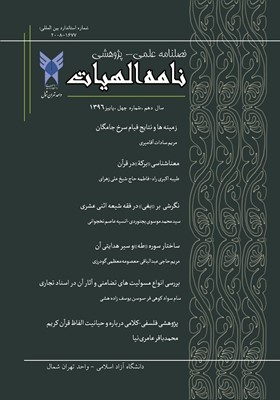بررسی فقهی-حقوقی جایگاه و قلمرو قاعده دراَ درحقوق کیفری ایران
محورهای موضوعی : نامه الهیاتمحمد حاجیان نژاد 1 * , فهیم مصطفی زاده 2 , مهرداد فیضی 3
1 - گروه فقه و حقوق، دانشگاه عدالت، تهران، ایران.
2 - گروه فقه و حقوق، دانشگاه عدالت، تهران، ایران.
3 - گروه فقه و حقوق، دانشگاه عدالت، تهران، ایران.
کلید واژه: قصاص, شبهه, حدود, تعزیرات, قاعده دراَ,
چکیده مقاله :
قاعده دراَ قاعدهای اصطیادی است که فقها آن را در مجموعهای از روایات اخذ نموده اند. قاعده دراَ یعنی متوقف ساختن مجازاتهای حدود، قصاص و تعزیرات در مواردی که شبهه به میان باشد. قاعده دراَ در برخی از موارد کیفر زدایی جزئی میکند و در برخی موارد کیفر زدایی کلی، باتوجه به مستندات قرآنی و روایی واژه حد در مستندات قاعده نمی تواند به معنای مجازات خاص باشد و شامل تمامی مجازات ها می شود، قاعده دراَ باتوجه به ماده 120و 121 قانون مجازات می تواند اثر جرم زدایی و کیفر زدایی داشته باشد و تقاوتی میان حدود الهی و حق الناس وجود ندارد، البته قانونگذار چهار جرم از جرایم حدی را استثنا کرده است. همچنین در جنایات مستوجب قصاص با توجه به شرایط جرم و مسئولیت کیفری جرم دو اثر جرم زدایی و محکومیت زدایی را دارد. در جرائم تعزیری با توجه به شرایط مسئولیت کیفری و شرط خود جرم اثر جرم زدایی و محکومیت زدایی را دارد و در اعمال قاعدهی دراَ تفاوتی میان جرایم تعزیری و حکومتی وجود ندارد. به نظر می رسد که اصل رفتار در جرایم دیه مورد شک قرارگیرد قاعدهی درأ اثر جرم زدایی دارد.
The rule of Dara is a catch rule that jurists have obtained in a collection of narrations. The rule of Daraa means stopping the punishments of hudud, retribution and punishment in cases where there is doubt. In some cases, the rule of Dara provides partial decriminalization and in some cases general decriminalization, according to the Quranic documents and the authenticity of the word hadd in the documents of the rule, it cannot mean a specific punishment and includes all punishments, the rule of Dara according to Articles 120 and 121 of the Penal Code can have the effect of decriminalization and decriminalization, and there is no conflict between divine limits and human rights, although the legislator has excluded four crimes from the limited crimes. Also, according to the circumstances of the crime and criminal responsibility, the crime has two effects of decriminalization and deconviction in crimes requiring retribution. In penal crimes, according to the conditions of criminal liability and the condition of the crime itself, it has the effect of decriminalization and de-conviction, and there is no difference between penal and governmental crimes in the application of the rule of law. It seems that the principle of behavior in the crimes of money is doubted, the rule of money has the effect of decriminalization.
_||_

